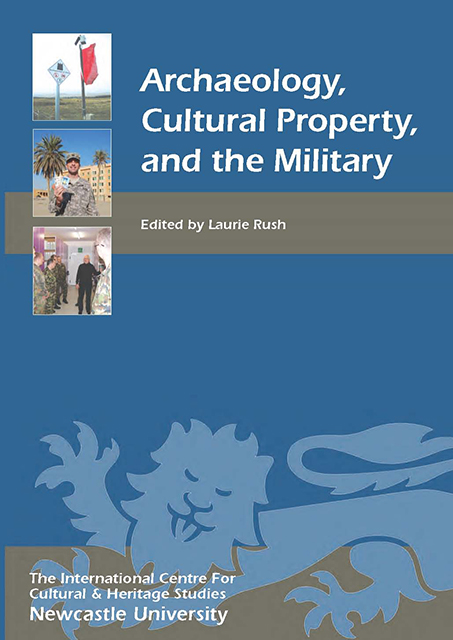Book contents
- Frontmatter
- Contents
- List of Illustrations: Figures and Tables
- Archaeology and the Military: An Introduction
- 1 The Obligations Contained in International Treaties of Armed Forces to Protect Cultural Heritage in Times of Armed Conflict
- 2 Rescuing Europe’s Cultural Heritage: The Role of the Allied Monuments Officers in World War II
- 3 The UK’s Training and Awareness Programme
- 4 US Army Civil Affairs: Protecting Cultural Property, Past and Future
- 5 Cultural Property Protection in the Event of Armed Conflict: Deploying Military Experts or Can White Men Sing the Blues?
- 6 Good Training and Good Practice: Protection of the Cultural Heritage on the UK Defence Training Estate
- 7 In-Theatre Soldier Training through Cultural Heritage Playing Cards: A US Department of Defense Example
- 8 Dealing the Heritage Hand: Establishing a United States Department of Defense Cultural Property Protection Program for Global Operations
- 9 Teaching Cultural Property Protection in the Middle East: The Central Command Historical/Cultural Advisory Group and International Efforts
- 10 Cultural Resources Data for Heritage Protection in Contingency Operations
- 11 Time not on my Side: Cultural Resource Management in Kirkuk, Iraq
- 12 US Military Support of Cultural Heritage Awareness and Preservation in Post-Conflict Iraq
- 13 Operation Heritage
- 14 Cultural Property Protection in the Event of Armed Conflict – Austrian Experiences
- 15 The Role of the Swiss Armed Forces in the Protection of Cultural Property
- 16 Preserving Global Heritage from Space in Times of War
- Appendix 1 1954 Hague Convention and its two Protocols
- Appendix 2 Author Biographies
- Index
5 - Cultural Property Protection in the Event of Armed Conflict: Deploying Military Experts or Can White Men Sing the Blues?
Published online by Cambridge University Press: 28 February 2023
- Frontmatter
- Contents
- List of Illustrations: Figures and Tables
- Archaeology and the Military: An Introduction
- 1 The Obligations Contained in International Treaties of Armed Forces to Protect Cultural Heritage in Times of Armed Conflict
- 2 Rescuing Europe’s Cultural Heritage: The Role of the Allied Monuments Officers in World War II
- 3 The UK’s Training and Awareness Programme
- 4 US Army Civil Affairs: Protecting Cultural Property, Past and Future
- 5 Cultural Property Protection in the Event of Armed Conflict: Deploying Military Experts or Can White Men Sing the Blues?
- 6 Good Training and Good Practice: Protection of the Cultural Heritage on the UK Defence Training Estate
- 7 In-Theatre Soldier Training through Cultural Heritage Playing Cards: A US Department of Defense Example
- 8 Dealing the Heritage Hand: Establishing a United States Department of Defense Cultural Property Protection Program for Global Operations
- 9 Teaching Cultural Property Protection in the Middle East: The Central Command Historical/Cultural Advisory Group and International Efforts
- 10 Cultural Resources Data for Heritage Protection in Contingency Operations
- 11 Time not on my Side: Cultural Resource Management in Kirkuk, Iraq
- 12 US Military Support of Cultural Heritage Awareness and Preservation in Post-Conflict Iraq
- 13 Operation Heritage
- 14 Cultural Property Protection in the Event of Armed Conflict – Austrian Experiences
- 15 The Role of the Swiss Armed Forces in the Protection of Cultural Property
- 16 Preserving Global Heritage from Space in Times of War
- Appendix 1 1954 Hague Convention and its two Protocols
- Appendix 2 Author Biographies
- Index
Summary
INTRODUCTION
Why on earth should the military be involved in Cultural Property Protection (CPP)?
Aren't they in the business of destroying cultural property?
Is it ethical to cooperate with the military where CPP is concerned?
Protection of culture is not a priority; saving lives and providing water and food is more important.
Military units do not have the necessary expertise to handle artefacts.
Should social scientists cooperate with the military at all?
We are already doing something with culture!
The above are just a few of the questions and statements raised by the legal requirement to protect cultural property during conflict for those countries that have ratified the 1954 Hague Convention for the Protection of Cultural Property in the Event of Armed Conflict; and archaeologists who have worked with the military to enable the latter to fulfil these legal requirements (or, in the case of those countries that have not ratified the Hague Convention, to work within the spirit of the Convention) have been criticised by colleagues (see, for example, Hamilakis 2003; 2009).
This criticism came to a head during the sixth World Archaeological Congress (WAC-6) in Dublin in 2008 (Rothfield 2008b; and see Gerstenblith 2009; Hamilakis 2009; Stone 2009). The discussion was driven by strongly held ethical beliefs, and archaeologists who had chosen to partner with the military were labelled as ‘part of the problem’ and were accused of losing their impartiality. These arguments echo the debates of the 1960s, when similar allegations were made about individuals partnering in various capacities with the military. However, the situation then was completely different. At that time the majority of protestors were young intellectuals, often students, demonstrating against major powers and wars of, at least perceived, colonialism. Since then the political climate and world order have changed considerably, and the majority of conflicts are no longer ‘symmetric’ – the clashing of two, usually international, conventional adversaries in intense and violent battles – but tend to be ‘asymmetric’, in which combatants are unequally matched and therefore frequently use non-conventional methods of warfare intended to exploit their opponents’ weaknesses, thereby offsetting their own quantitative or qualitative deficiencies. As a result, the mindset of military planners in relation to the tasks they have to undertake is (slowly) changing.
- Type
- Chapter
- Information
- Archaeology, Cultural Property, and the Military , pp. 41 - 59Publisher: Boydell & BrewerPrint publication year: 2010
- 5
- Cited by



